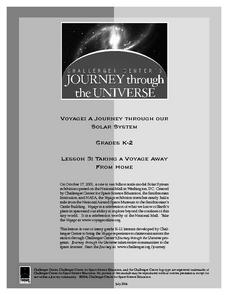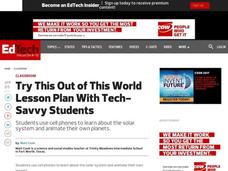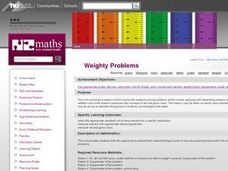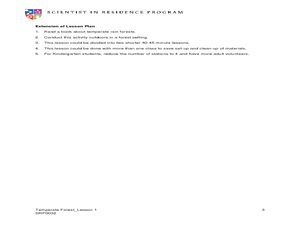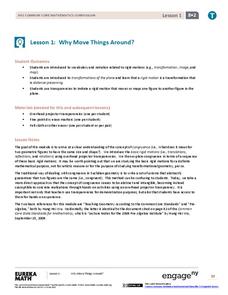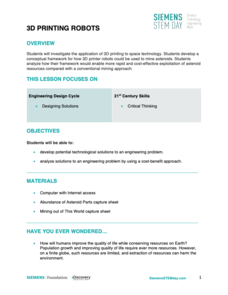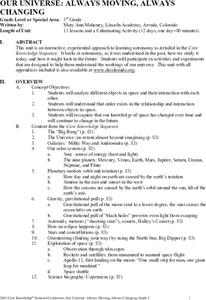Curated OER
Taking a Voyage away from Home
Students experience and participate in a journey through a "Voyage" exhibition of the Solar System and the frontier it covers. They build a dynamic model of the Earth and Sun. Descriptions are given on the relative sizes of the Sun and...
Curated OER
Weather
Students explore the earth's atmosphere, weather, and climate. They begin class with a discussion about weather patterns, atmosphere, and the layers of the earth. After the class discussion, students rotate through four stations to...
Curated OER
Modeling the Change of Seasons
Students evaluate data to determine changes in length of day. They model the revolution of Earth around the sun to show changes in length of day and sun angle and illustrate how the sun angle affects the change of season.
Curated OER
Out of This World
Fifth graders animate their own planets. In this solar system lesson, 5th graders use smartphones and the software, GoKnow Sketchy, to create images for presentations on their created planets that appear to be animated when played at a...
Curated OER
Wind Power
Fourth graders develop an understanding of how engineers use wind to generate electricity. They will build a model anemometer to better understand and measure wind speed. They discover that engineers design wind turbines that generate...
Curated OER
SUNSPOTS SPOTTED
Students study sunspots and their motion, from data gathered, they determine the significance of the sunspot data. The data be used to calculate the rotational period of the sun. They draw conclusions as to the sunspot's impact on the...
Curated OER
Stations of Light
Student groups rotate through four stations to examine light energy behavior: refraction, magnification, prisms and polarization. They see how a beam of light is refracted (bent) through various transparent mediums. Students investigate...
Curated OER
Bellwork Week 20-Space Science
In this space worksheet, students answer questions about the size comparison of the moon, Earth, Solar System, Virgo Cluster, Milky Way Galaxy, and Universe, they answer questions about the Milky Way Galaxy and they sketch the life cycle...
Curated OER
Mass: Applying and Interpreting
Students rotate through six studying stations solving problems that involve applying and interpreting aspects of mass. They solve various word problems, and measure the contents of cans and calculate the mass of two cans.
Curated OER
Sampling Rocks
Students investigate rocks. In this earth science lesson, students collect rocks from the schoolyard and describe each of the rocks. Students measure and weigh each rock and record the results. Students create a rock guide for the...
Curated OER
Exploring Forest Objects
Students explore the forest. In this ecosystems instructional activity, students rotate through sensory activity centers, brainstorm, and read about temperate forests.
Curated OER
Jupiter
A student-produced PowerPoint provides basic facts about the planet of Jupiter. Illustrated slides highlight its physical attributes and satellites. A lot of interesting information about Jupiter is included, such as the fact that twenty...
Curated OER
Moon Shadows
Students study the moon and its shadows. In this moon lesson students complete a lab activity that shows the different shadows and answer questions.
Space Awareness
Measure the Solar Diameter
Scientists could measure the diameter of the sun before they knew its distance. Scholars construct a simple mirror box to measure the diameter for themselves. They compare this measurement with the official size, listed in a textbook,...
Mr. Hill's Science Website
Solar System Fact Sheet
Here is a fantastic, educational handout packed with information and facts not only about the planets in our solar system, but also regarding major moons and their surface features, dwarf planets, comets, and asteroids.
EngageNY
Why Move Things Around?
Explore rigid motion transformations using transparency paper. Learners examine a series of figures and describe the transformations used to create the series. They then use transparency paper to verify their conclusions.
Colorado State University
What Is Energy?
Don't let the energy of your classroom falter! Explore the scientific definition of energy through play. A hands-on lesson focuses on the change of energy from one form to another.
Discovery Education
3D Printing Robots
What is water worth to you? The answer probably depends on many different variables. Learners explore the value of water in space and what it takes to transport the resource to locations in a galaxy far far away. They then consider...
Discovery Education
Smoke on the Water
How do clouds form? Learners demonstrate the formation of clouds and the water cycle by testing four different setups in a plastic bottle. They identify the key components of a cloud to help them understand the process of cloud...
Curated OER
Astronomy
Students explore the rotation of the Earth and observe the shapes of constellations. After discussing how the Earth moves. volunteers use a flashlight and globe to model the movement of the sun-Earth system. Using Digitalis technology,...
Curated OER
As the World Turns
Students will use their bodies to act out the motions of Earth by exploring orbits, rotations, and the turning of the earth as it revolves around the sun. Doing research to find correct answers to their questions will help them act out...
Curated OER
Modeling the Seasons
Learners explore the seasons and their attributes. For this geography lesson, students create a 3-D model of the Earth that showcases the elliptical travel of the Earth that causes seasons.
Curated OER
I Can See and Feel the Change in the Seasons
Pupils use their senses to investigate the changes in the seasons. They discuss how the Earth moves around the sun and its tilt. They practice using new vocabulary and examining the different seasons.
Curated OER
Our Universe: Always Moving, Always Changing
Students explore the main concepts of astronomy through the eleven lessons of this unit. The past, present, and future methods of studying the science are examined in this unit.


